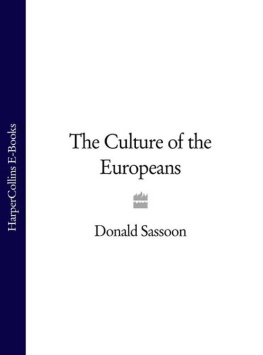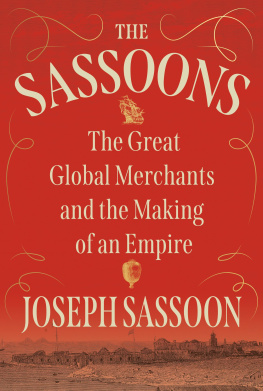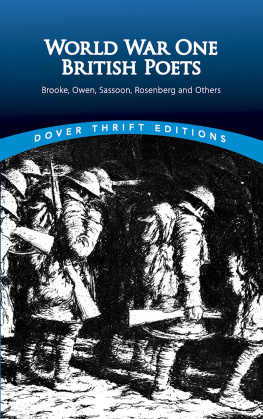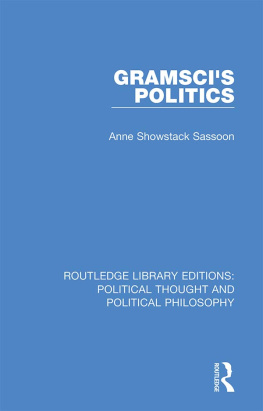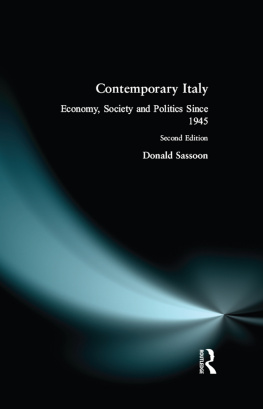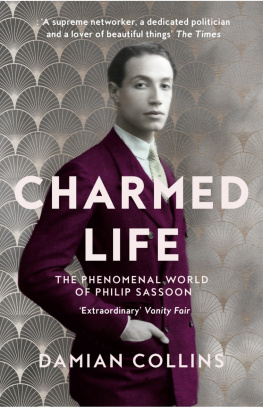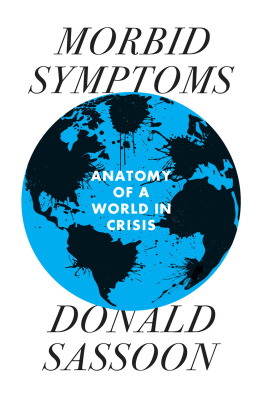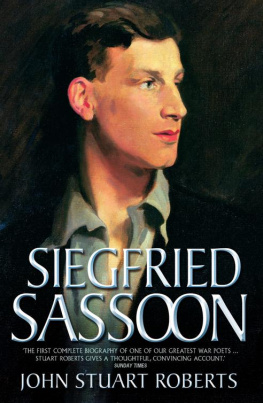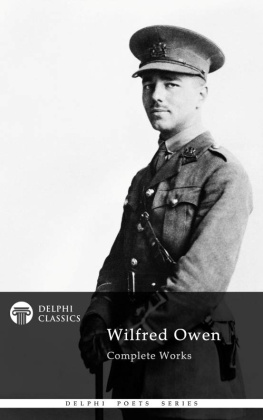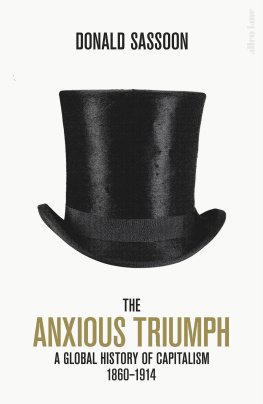Donald Sassoon [Sassoon - The Culture of the Europeans (Text Only Edition)
Here you can read online Donald Sassoon [Sassoon - The Culture of the Europeans (Text Only Edition) full text of the book (entire story) in english for free. Download pdf and epub, get meaning, cover and reviews about this ebook. year: 2012, publisher: HarperCollins Publishers, genre: Art. Description of the work, (preface) as well as reviews are available. Best literature library LitArk.com created for fans of good reading and offers a wide selection of genres:
Romance novel
Science fiction
Adventure
Detective
Science
History
Home and family
Prose
Art
Politics
Computer
Non-fiction
Religion
Business
Children
Humor
Choose a favorite category and find really read worthwhile books. Enjoy immersion in the world of imagination, feel the emotions of the characters or learn something new for yourself, make an fascinating discovery.
- Book:The Culture of the Europeans (Text Only Edition)
- Author:
- Publisher:HarperCollins Publishers
- Genre:
- Year:2012
- Rating:3 / 5
- Favourites:Add to favourites
- Your mark:
- 60
- 1
- 2
- 3
- 4
- 5
The Culture of the Europeans (Text Only Edition): summary, description and annotation
We offer to read an annotation, description, summary or preface (depends on what the author of the book "The Culture of the Europeans (Text Only Edition)" wrote himself). If you haven't found the necessary information about the book — write in the comments, we will try to find it.
Donald Sassoon [Sassoon: author's other books
Who wrote The Culture of the Europeans (Text Only Edition)? Find out the surname, the name of the author of the book and a list of all author's works by series.
The Culture of the Europeans (Text Only Edition) — read online for free the complete book (whole text) full work
Below is the text of the book, divided by pages. System saving the place of the last page read, allows you to conveniently read the book "The Culture of the Europeans (Text Only Edition)" online for free, without having to search again every time where you left off. Put a bookmark, and you can go to the page where you finished reading at any time.
Font size:
Interval:
Bookmark:

THE EUROPEANS
FROM 1800
TO THE PRESENT

DONALD SASSOON

To Eric Hobsbawm,
il miglior maestro
At nine oclock on a weekday morning in December 2000, South Clapham underground station in South London is still crowded with people trying to board the tube. The line splits at Kennington station, with some trains proceeding towards the City and others towards the West End. There the trains will disgorge the majority of passengers who will spend the rest of the day in offices and shops. Inside the train, some have the vacant, bored look of those with nothing to do, but some glance at the advertising or read the Poem on the Underground a scheme launched in 1986 by an American writer living in London to bring poetry to passengers. They read maybe for the first time Shelleys Ozymandias (I met a traveller from an antique land). Others, the majority, busy themselves in various ways. Some of the women read magazines. Others, particularly the lucky ones able to secure a seat, read a daily paper. There, a young man looks, distractedly, at the Sun, the largest-selling tabloid; a young woman reads the Daily Mail, another high-selling daily; but almost the whole of the British daily press is represented in this one carriage including the liberal Guardian, read by another woman, and the Financial Times, in the hands of a man who does not look like a banker (no tie, no grey suit). The best-selling daily, however, is one which is not sold but given away free and called, appropriately, Metro and also available in Stockholm, Prague, Budapest, Amsterdam, Rome, Toronto, Athens, Warsaw, and Helsinki.
Some read books. The titles are not easy to fathom. Perhaps they are the current best-sellers. Well-trained eyes can identify the distinctive black cover of a Penguin classic read by a young woman, perhaps a student, oblivious to the world around her. Could it be Madame Bovary, or a Jane Austen, or one of the shorter Tolstoys? High-culture vultures can only speculate, rejoicing: civilisation has not yet ended; high culture lives on. One (older) person is rapidly completing a crossword puzzle; another (younger, male) is nervously playing with his Nintendo GameBoy machine, developing, no doubt, his reflexes. Other passengers have tiny earphones stuck into their ears, the wire disappearing into their bags or jackets and connected to an unseen disc or cassette player the iPod is yet to come.
The tube is heaving with the consumption of culture.
Most of the passengers would have started their day listening to the radio, or eating their hurried breakfast watching some of the morning shows on television, perhaps with their children, or reading yesterdays newspaper or even todays, delivered by a newsboy on his rounds. Some of the passengers, those who work in shops or restaurants, will spend the rest of the day listening, whether they like it or not, to music. Some many work in the culture-producing business themselves, selling books and records, working for publishers, making their way to recording and film and video studios, working for one of the television networks or radio stations, or one of the magazines and newspapers which have offices in London, or in the growing software and computing service sector. They are among the 900,000 people employed in what the Department of Culture calls the creative industries, that is, Those industries which have their origin in individual creativity, skill and talent and which have a potential for wealth and job creation through the generation and exploitation of intellectual property.
After a days work some of these Londoners will linger on in the centre of town, meeting friends or loved ones or, on their own or with others, will go to a cinema, a theatre, a concert, the opera, a club, or a wine bar or pub where more music will be provided while they drink and talk. The majority, however, will go home, and there they will sit in front of the television. The set might have been switched on earlier by the children who spent the day at school, imbibing, one hopes, culture or other members of the household. Some may sit before a computer, playing games or surfing the net. If there is nothing of interest on television they can watch a programme they have previously recorded or a video rented from a shop, or they can listen to the radio, or read a book, for these are still written, published and sold in numbers far greater than in previous centuries despite the death of the book predicted in a spate of books. There are, of course, those who do not work or go to school. Some are unemployed, but they still have a television and a radio. The majority, however, are retired, their working days behind. They spend the day watching television, listening to the radio, reading, attending to their hobbies, working part-time in voluntary organisations, or even going to classes, learning new skills.
In the other cities of Europe similar scenes are being played out. The choice may not be quite as considerable as it is in London, one of the great cultural centres of the world, but it is still vast.
The road to this bountiful supply of cultural artefacts, a situation so many take for granted, was long. Two centuries before, in 1800, most of the counterparts of our Clapham passengers could neither read nor write. School was not compulsory. Universities were attended by a tiny lite. There were no paid holidays. People did not retire, and in any case died young. Most would not have been able to afford books or even to borrow them from a lending library. Those who went to work, in the fields or the factories, seldom read anything. Their only experience of music, if any, might have been in the local church on Sundays, or during one of the rare festivals and fairs held during the year. There was the odd folk song and the odd penny novel or ballad, but on the whole the pleasures of reading were largely confined to the middle classes, still a narrow stratum even in Great Britain, then the richest country in the world, and perhaps their servants. The aristocracy was, of course, more privileged. Books were available to them, as were concerts and shows; but even they, in 1800, were culturally deprived compared to an ordinary shop assistant in 2000.
The history of the extraordinary expansion of cultural consumption over the last two hundred years constitutes the subject-matter of this work.
Culture is a strange and loaded word. Today, in common parlance, it is used mainly in an anthropological sense as suggested in 1871 by Edward Burnett Tylor in his Primitive Culture: Culture or civilization, taken in its wide ethnographic sense, is that complex whole which includes knowledge, belief, art, morals, law, custom, and any other capabilities and habits acquired by man as a member of society. The singular is absolutist; the plural is relativist. Cultures denote a set of values as well as a set of practices: the food we eat, the clothes we wear, the kind of leisure we pursue, the rituals we abide by, the traditions we embrace or invent, and the ideas we follow. Here culture is to use a contemporary expression life-style.
In its modern genesis, which can be traced to the Enlightenment, culture also suggests civilisation and excellence. The optimistic version of this some would call it, with hindsight, downright nave was propounded by Condorcet in 1787: The more civilisation spreads across the planet, the more we will witness the disappearance of wars and conquests, slavery and misery. This has, inevitably, a political subtext: it suggests a clash between different cultures, between dominant and subordinate social groups.
Next pageFont size:
Interval:
Bookmark:
Similar books «The Culture of the Europeans (Text Only Edition)»
Look at similar books to The Culture of the Europeans (Text Only Edition). We have selected literature similar in name and meaning in the hope of providing readers with more options to find new, interesting, not yet read works.
Discussion, reviews of the book The Culture of the Europeans (Text Only Edition) and just readers' own opinions. Leave your comments, write what you think about the work, its meaning or the main characters. Specify what exactly you liked and what you didn't like, and why you think so.

